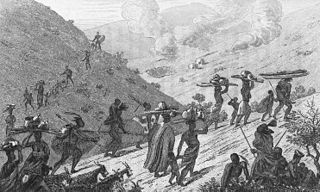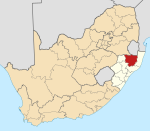
Shaka kaSenzangakhona, also known as Shaka Zulu, was one of the most influential monarchs of the Zulu Kingdom.
The Zulu are a Bantu ethnic group of Southern Africa and the largest ethnic group in South Africa, with an estimated 10–12 million people living mainly in the province of KwaZulu-Natal. Small numbers also live in Zimbabwe, Zambia, Tanzania and Mozambique.

Zulu or isiZulu is the language of the Zulu people, with about 10 million speakers, the vast majority of whom live in South Africa. Zulu is the most widely spoken home language in South Africa, and it is understood by over 50% of its population. It became one of South Africa's 11 official languages in 1994.

The Anglo-Zulu War was fought in 1879 between the British Empire and the Zulu Kingdom. Following Lord Carnarvon's successful introduction of federation in Canada, it was thought that similar political effort, coupled with military campaigns, might succeed with the African kingdoms, tribal areas and Boer republics in South Africa. In 1874, Sir Henry Bartle Frere was sent to South Africa as High Commissioner for the British Empire to bring such plans into being. Among the obstacles were the presence of the independent states of the South African Republic and the Kingdom of Zululand and its army.

KwaZulu-Natal is a province of South Africa that was created in 1994 when the Zulu bantustan of KwaZulu and Natal Province were merged. It is located in the southeast of the country, enjoying a long shoreline beside the Indian Ocean and sharing borders with three other provinces and the countries of Mozambique, Eswatini and Lesotho. Its capital is Pietermaritzburg and its largest city is Durban. It is the 2nd most populous province in South Africa, with slightly fewer residents than Gauteng.
NATAL or Natal may refer to:

Mfecane, also known by the Sesotho name Difaqane or Lifaqane, was a period of widespread chaos and warfare among indigenous ethnic communities in southern Africa during the period between 1815 and about 1840.

The Battle of Isandlwana on 22 January 1879 was the first major encounter in the Anglo–Zulu War between the British Empire and the Zulu Kingdom. Eleven days after the British commenced their invasion of Zululand in South Africa, a Zulu force of some 20,000 warriors attacked a portion of the British main column consisting of about 1,800 British, colonial and native troops and perhaps 400 civilians. The Zulus were equipped mainly with the traditional assegai iron spears and cow-hide shields, but also had a number of muskets and old rifles. The British and colonial troops were armed with the modern Martini-Henry breech-loading rifle and two 7-pounder mountain guns deployed as field guns, as well as a Hale rocket battery. Despite a vast disadvantage in weapons technology, the numerically superior Zulus ultimately overwhelmed the poorly led and badly deployed British, killing over 1,300 troops, including all those out on the forward firing line. The Zulu army suffered anywhere from 1,000 to 2,500 killed.

KwaZulu was a semi-independent bantustan in South Africa, intended by the apartheid government as a homeland for the Zulu people. The capital was moved from Nongoma to Ulundi in 1980.
Ezemvelo KZN Wildlife is a governmental organisation responsible for maintaining wildlife conservation areas and biodiversity in KwaZulu-Natal Province, South Africa. Their headquarters is in Queen Elizabeth Park situated on the northern slopes of Pietermaritzburg, the KwaZulu-Natal provincial capital. Prior to 1994, it was known as the Natal Parks Board.

Inanda is a township in eastern KwaZulu-Natal, South Africa that is situated 24 km inland from Durban; it now forms part of eThekwini, the Greater Durban Metropolitan Municipality. Populated primarily by Zulu-speaking Black Africans, Inanda is known as the home of John Langalibalele Dube, first president of the African National Congress (ANC), as a residence/base of operations of Mahatma Gandhi, and as birthplace of the syncretic Nazareth Baptist Church.

Pieter Mauritz Retief was a Voortrekker leader. Settling in 1814 in the frontier region of the Cape Colony, he assumed command of punitive expeditions in response to raiding parties from the adjacent Xhosa territory. He became a spokesperson for the frontier farmers who voiced their discontent, and wrote the Voortrekkers' declaration at their departure from the colony.
Black people from South Africa were at times officially called Bantu by the apartheid regime. The term Bantu is derived from the word for "people" common to many of the Bantu languages. The Oxford Dictionary of South African English describes its contemporary usage in a racial context as "obsolescent and offensive" because of its strong association with white minority rule and the apartheid system. However, Bantu is used without pejorative connotations in other parts of Africa.

Shaka Zulu is a 1987 album by South African a cappella group Ladysmith Black Mambazo.

The Kingdom of Zulu, sometimes referred to as the Zulu Empire or the Kingdom of Zululand, was a monarchy in Southern Africa that extended along the coast of the Indian Ocean from the Tugela River in the south to Pongola River in the north.

uMgungundlovu was the royal capital of the Zulu King Dingane (1828–1840) and one of several military complexes (amakhanda) which he maintained. He established his royal kraal in 1829 in the eMakhosini valley against Lion hill (Singonyama), just south of the White Umfolozi River.

Mtwalume is a settlement in Ugu District Municipality in the KwaZulu-Natal province of South Africa.

Lindiwe Daphney Zulu is South Africa's Minister of Small Business Development.

The Piet Retief Delegation massacre occurred when Voortrekkers under Piet Retief migrated into Natal in 1837 and negotiated a land treaty in February 1838 with the Zulu King Dingane. Upon realizing the ramifications of the imposed contract, Dingane doublecrossed the Voortrekkers, killing the delegation of 100 including their leader Piet Retief on 6 February 1838. The land treaty was later found in Piet Retief's possession. It gave the Voortrekkers the land between the Tugela River and Port St. Johns. This event eventually led to the Battle of Blood River and the eventual defeat of Dingane.


















